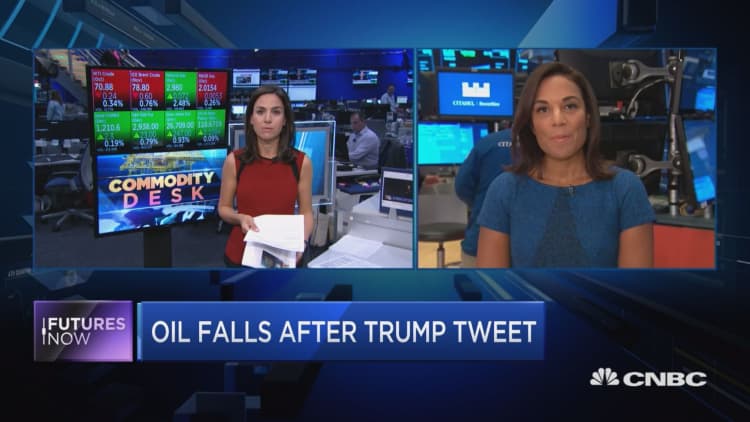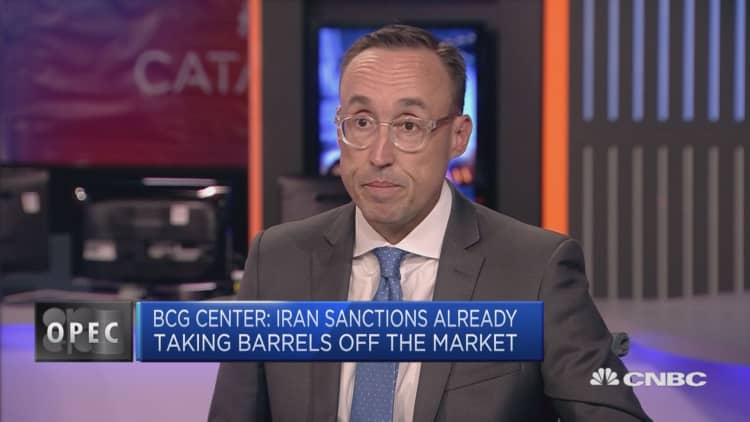
Oil prices pared gains on Friday, reversing a late morning rally, following a report that OPEC and its allies are considering a coordinated increase in crude production.
The 15-nation OPEC cartel and a group of producers led by Russia are discussing a potential increase of 500,000 barrels a day, Reuters reported, citing an unnamed source. The talks are occurring ahead of the producers' meeting in Algeria this weekend, where they are scheduled to discuss allocating a production increase announced in June.
Brent crude, the international benchmark for oil prices, rose as high as $80.12 on Friday, but fell sharply after the Reuters report. It was trading up 11 cents at $78.81 by 2:29 p.m. ET.
U.S. West Texas Intermediate crude ended Friday's session up 46 cents at $70.78, off a session high of $71.80.
The report also comes after President Donald Trump criticized OPEC on Twitter, saying the group is pushing oil prices higher while benefiting from U.S. military protection. Trump has tweeted at OPEC several times this year, demanding the producer group take action to tame oil prices, which are near a four-year high above $80 a barrel.
Prior to the Reuters report, analysts told CNBC it was highly unlikely that Sunday's meeting in Algiers would produce a major policy decision. However, they said top exporter Saudi Arabia faced the challenge of appeasing Trump, who wants OPEC to boost production, while maintaining cohesion among the producers, many of whom could be hurt by lower oil prices caused by a supply increase.
"The 500,000 barrels is sort of a clever way for the Saudis to placate Trump too," said John Kilduff, founding partner at energy hedge fund Again Capital. "It's not that big of a number. It shouldn't really sink prices materially, but it does throw the president a boon."
The Reuters report did not specify whether the producers were considering taking the action at this weekend's meeting, which is meant to monitor adherence with OPEC's deal with other producers to keep 1.8 million barrels a day off the market. That kind of major policy decision is usually made only during OPEC's "ordinary" or "extraordinary" meetings.
The so-called Vienna Alliance agreed earlier this year to restore about 1 million barrels a day to the market after producers cut output more than they intended, putting upward pressure on oil prices. The producers are preparing for the impact of U.S. sanctions on Iran, OPEC's third largest producer, which could cut supply by about 1 million barrels a day.
"The country out in the cold obviously is Iran because nobody's standing in league with them," said Kilduff. "Everyone's talking about getting more oil on the market to offset the Iranian losses."

Tanker tracking and industry data show Iranian exports of crude have already begun to decline well before the imposition of new U.S. sanctions on Tehran.
"Iranian crude exports are coming (down) earlier and bigger than expected, at a time seasonal demand is strong. With spare capacity also falling sharply, the market remains exposed to supply-induced price shocks," ANZ Bank analysts said in a note to clients.
Jason Gammel, analyst at U.S. bank Jefferies, said he expects Saudi Arabia to try to keep the oil market adequately supplied into 2019, "but at the cost of spare capacity", a key supply buffer to prevent oil price volatility.
"Spare capacity could fall below 1 percent of demand by year-end if Iranian exports fall below 1 million barrels per day, as now seems likely," Gammel said.
— Reuters contributed to this story.


